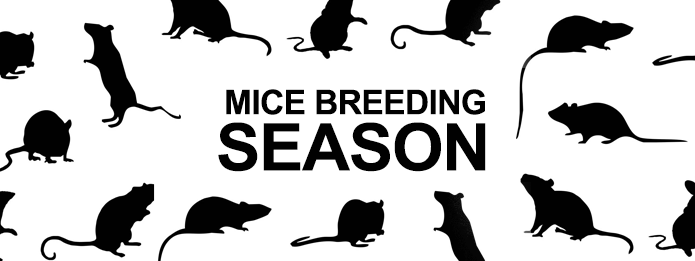
Seeing a mouse running across your bedroom floor is an unsettling sight for most homeowners. However, before you shrug the sighting off as a one-time event, consider the fact that most rodents reproduce very quickly. Once two mice set up a nest in your home, they multiply rapidly and can overtake your home in a matter of weeks. Here’s what you need to know about the mice breeding process and what you can do to stop it:
How Quickly Do Mice Reproduce?
The mouse breeding season is predictable because it will begin as soon as a male and female first make contact. Depending on the rodent, the gestation period is short, lasting between 18 and 22 days. Most litters produce an average of six pups. The average female mouse has eight litters per year, with separate litters being birthed within 20 days of each other. If you do not quickly take care of a mouse infestation, you can become overrun with rodents rapidly.
Mice breeding occurs throughout the year, and there is never any true breeding season. Typically, the mating season will decline during the winter months and increase during the summer months. However, once mice move indoors, temperatures are higher and food sources are more stable – making breeding year-round possible.
What Is the Life Cycle of Mice?
The average mouse life cycle will vary depending on various factors, including health, location and diet. Mice residing indoors can live up to two years, while mice living outdoors typically live up to a year. Mice live longer indoors, causing a big problem for homeowners. Keeping food sources sealed and off the ground is an effective way to encourage mice to migrate back outdoors. This can be a challenge since even though mice have poor eyesight, their sense of smell is cunning.
What Problems Can Mice Cause?
- Damage: Mice can cause structural damage to your home because of their tendency to chew constantly. Mice have sharp teeth and can chew through drywall, carpet, pipes, rubber, electrical wiring and furniture. If mice chew through necessary wiring, the chance of carbon monoxide poisoning or a gas leak increases.
- Diseases: Mice can spread diseases when they urinate or defecate. Mice have been known to set up their nests near a food source, potentially contaminating your family’s food supply. Some of the diseases cause by mice include:
- Hantavirus: Hantavirus is commonly found in the urine and feces of deer mice. The disease can be spread to humans if you come into direct content with mice droppings. The first signs of the disease are chills and a fever, but more severe problems such as kidney failure can occur if not treated.
- Salmonella: Mice can carry salmonella bacteria with them. If they come into contact with your kitchen surfaces or with your food supply, salmonella can be transferred to humans. Salmonella is a severe illness that can cause nausea and a high fever.
- Lymphocytic Choriomeningitis: This virus is carried by the ordinary house mouse and is found in many parts of the U.S. LCM is a severe neurological disease that can cause fever, nausea, muscle aches, and vomiting. If not treated, the virus can result in meningitis or encephalitis. Humans can become infected with LCM by touching an infected mouse or breathing in contaminated dust.
Contact Truly Nolen Canada for Assistance
You should not attempt to eliminate rodents in your home without the help of a professional pest control company like Truly Nolen. We provide various pest removal services in Guelph that can eliminate current infestations and prevent mice from returning. It is common for mice to seek refuge from the cold during the winter months.
Take action when you first suspect a pest infestation. Do not wait until the problem becomes unmanageable. Contact us today to schedule an inspection.